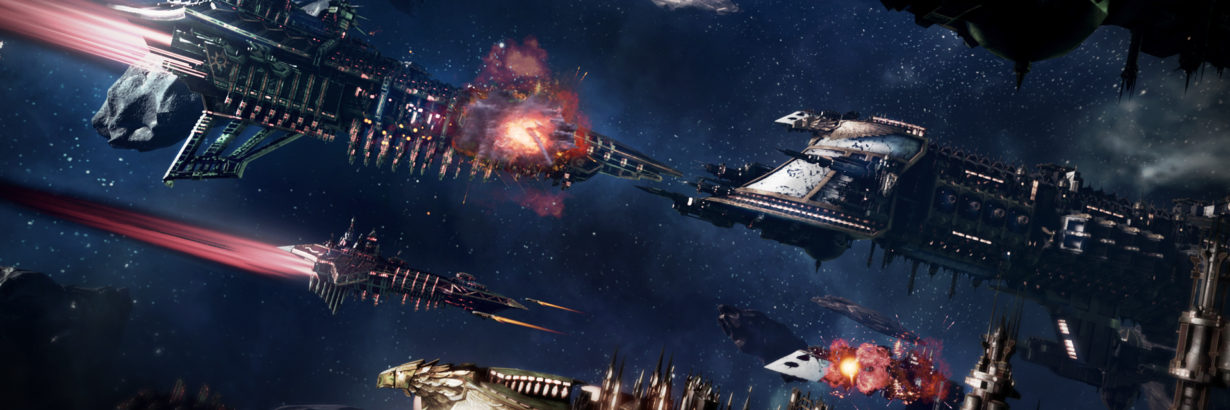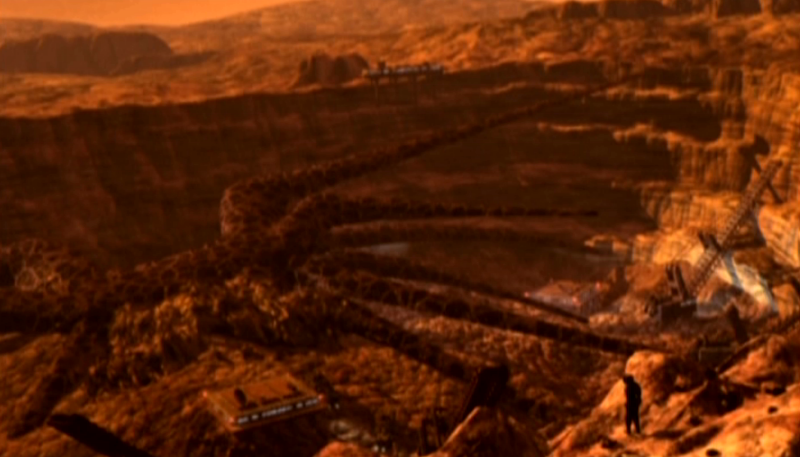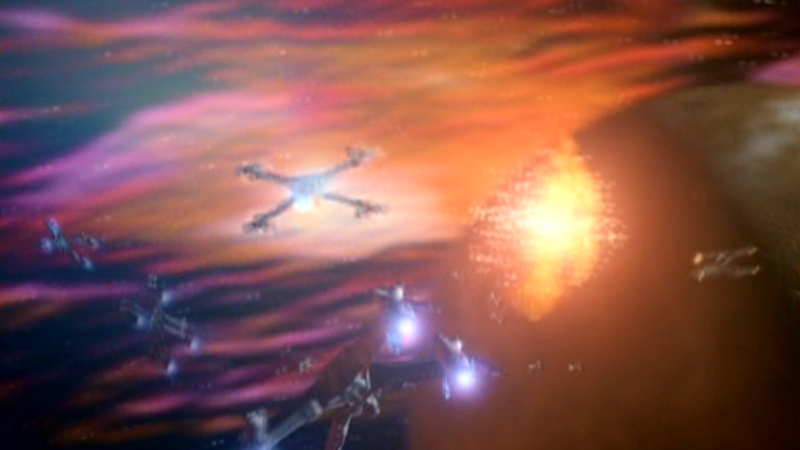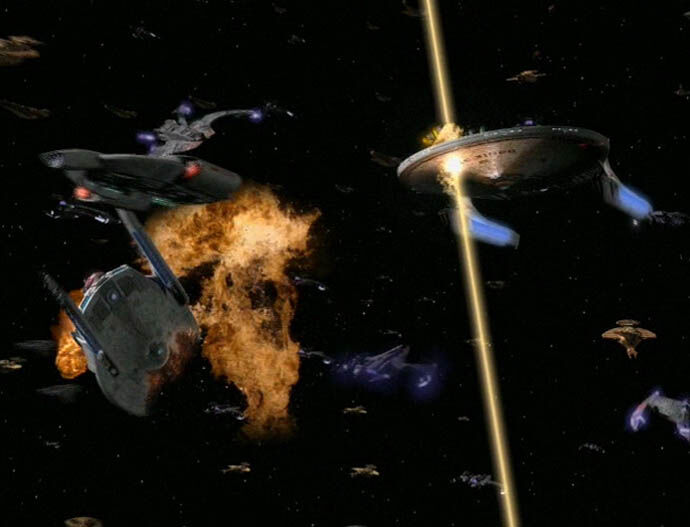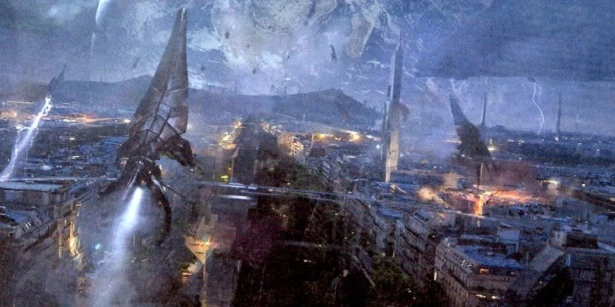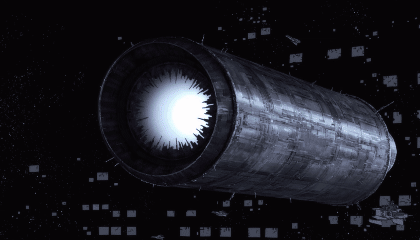When I say galactic, it doesn't necessarily needs to be in a galactic scale, just stuff with spaceships.
Here are my top three, in no particular order:
Idiran-Culture War (from Consider Phlebas)

Technically we see very little of this war, the book focus on a small group of people that only affect the conflict in small ways. Yet what makes this so great is the sheer scale of it. One of the big problems with galactic conflicts in fiction is that they feel remarkably small and simple. Star Wars is one of the best examples of this. The Republic clone army number in the millions. It's a small army for a planet wide conflict, image a galactic one.
The Culture, and in particular the Idiran Culture War is the opposite. The ships are amazingly powerful, the battles uninaginably big and destructive. It truly feels like galactic civilizations putting all their power into a conflict spanning a galaxy. Just look at these numbers:
Length of war: forty-eight years, one month. Total casualties, including machines (reckoned on logarithmic sentience scale), medjel and non-combatants: 851.4 billion (± .3%). Losses: ships (all classes above interplanetary)—91,215,660 (± 200); Orbitals—14,334; planets and major moons—53; Rings—1; Spheres—3; stars (undergoing significant induced mass-loss or sequence-position alteration)—6.
Banks, Iain M.. Consider Phlebas: A Culture Novel (Culture series) (p. 507). Little, Brown Book Group. Edição do Kindle.
This is how it should be!
Reaper Invasion (from Mass Effect 3)

The Reapar War has its fair shares of problems, but when it works, it works extremely well. It's a conflict that takes place in a galaxy you care about, involving people that you had a story with. The idea behind the Reapers (minus Starchild stuff) is amazing. I loved their visuals, their capacity for indoctrination and how they twist entire races to fight for them. Spearheading the efforts to defeat them was a unique experience, and one that result in many memorable and unforgettable moments.
Second Cylon War [from Battlestar Galactica (2003)]

Not really a war and more of a desperate retreat, but amazing all the same. What really makes this special in terms of conflict is just how good the space battles are. As far as I'm concerned, they are the very best in sci-fi. Seeing the Battlestar Galactica (and the Pegasus) engaging the Cylons was always a joy. Incredible visual effects, a unmatched sense of clarity, emotinal attachment to the people fighting and unforgivable odds made every engagement meaningful.
Here are my top three, in no particular order:
Idiran-Culture War (from Consider Phlebas)

Technically we see very little of this war, the book focus on a small group of people that only affect the conflict in small ways. Yet what makes this so great is the sheer scale of it. One of the big problems with galactic conflicts in fiction is that they feel remarkably small and simple. Star Wars is one of the best examples of this. The Republic clone army number in the millions. It's a small army for a planet wide conflict, image a galactic one.
The Culture, and in particular the Idiran Culture War is the opposite. The ships are amazingly powerful, the battles uninaginably big and destructive. It truly feels like galactic civilizations putting all their power into a conflict spanning a galaxy. Just look at these numbers:
Length of war: forty-eight years, one month. Total casualties, including machines (reckoned on logarithmic sentience scale), medjel and non-combatants: 851.4 billion (± .3%). Losses: ships (all classes above interplanetary)—91,215,660 (± 200); Orbitals—14,334; planets and major moons—53; Rings—1; Spheres—3; stars (undergoing significant induced mass-loss or sequence-position alteration)—6.
Banks, Iain M.. Consider Phlebas: A Culture Novel (Culture series) (p. 507). Little, Brown Book Group. Edição do Kindle.
This is how it should be!
Reaper Invasion (from Mass Effect 3)

The Reapar War has its fair shares of problems, but when it works, it works extremely well. It's a conflict that takes place in a galaxy you care about, involving people that you had a story with. The idea behind the Reapers (minus Starchild stuff) is amazing. I loved their visuals, their capacity for indoctrination and how they twist entire races to fight for them. Spearheading the efforts to defeat them was a unique experience, and one that result in many memorable and unforgettable moments.
Second Cylon War [from Battlestar Galactica (2003)]

Not really a war and more of a desperate retreat, but amazing all the same. What really makes this special in terms of conflict is just how good the space battles are. As far as I'm concerned, they are the very best in sci-fi. Seeing the Battlestar Galactica (and the Pegasus) engaging the Cylons was always a joy. Incredible visual effects, a unmatched sense of clarity, emotinal attachment to the people fighting and unforgivable odds made every engagement meaningful.




